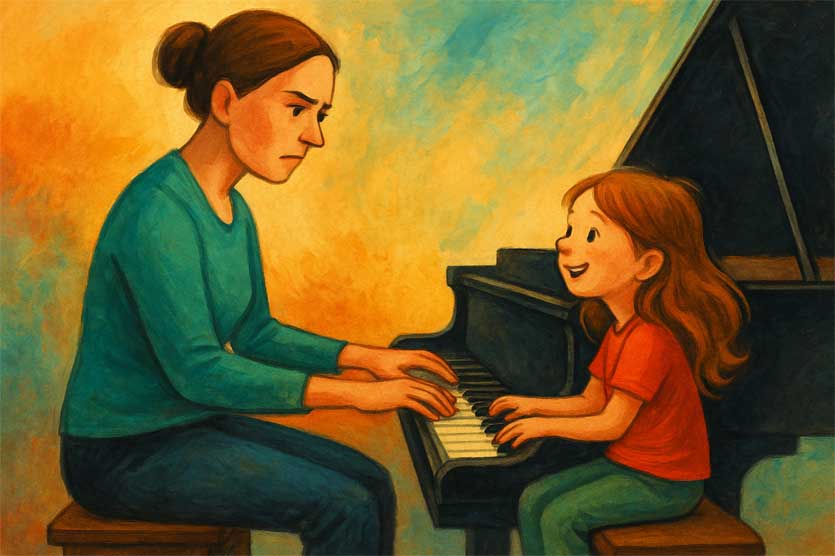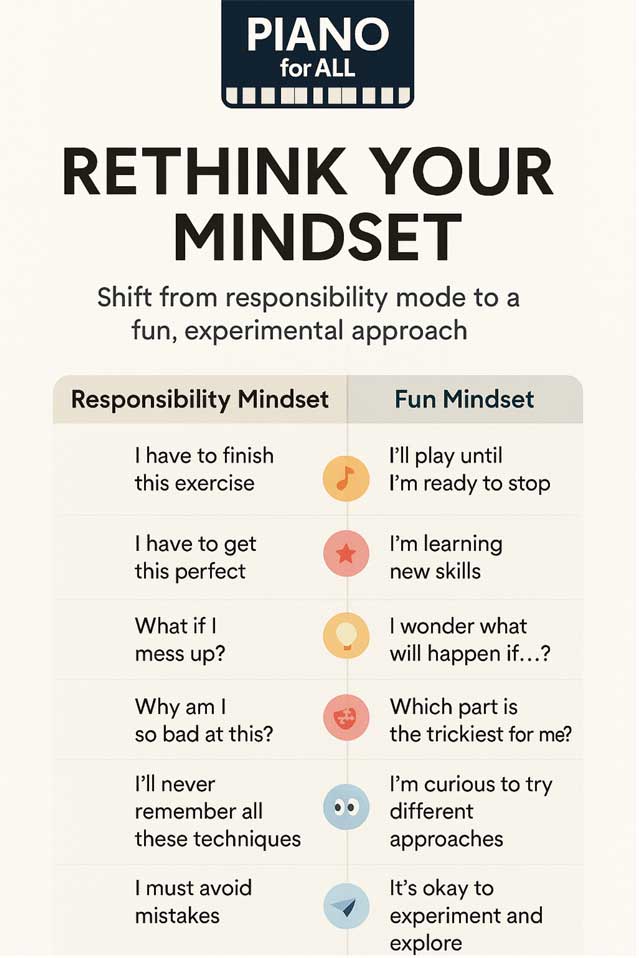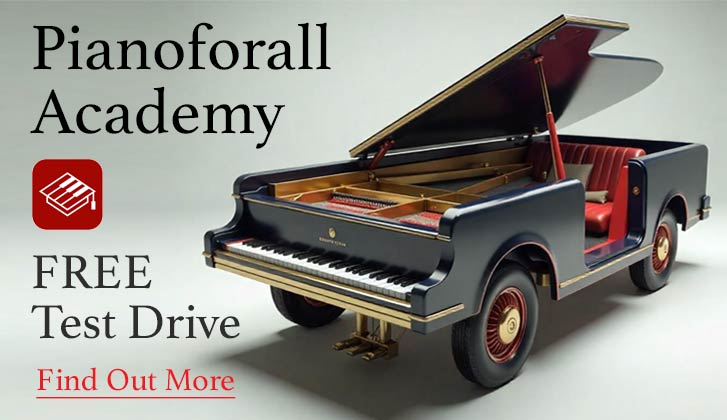Are You Bringing Your Work Mindset to the Piano Bench?
If you’re an adult learning piano, chances are you’ve mastered the art of responsibility and an outcome-driven mindset. But when it comes to music, that same mindset might be quietly sabotaging your joy. In this post, we explore how shifting from a performance-driven attitude to a playful, curious one can help you learn faster, enjoy more — and stick with it longer. Especially helpful for anyone using self-paced courses like Piano for All or just rediscovering music for fun.
The Habits That Shape Who We Think We Are
Have you tried your best to live a life based on adult responsibility, becoming competent at what you do for a living, caring for others, saying yes when you really want to say no, striving to be appreciated and valued?
You probably have. And you know what? It’s left a mark. Not because it’s a bad thing or anything like that, but because habits do that – they shape our reactions, the way we do things to the point they start feeling like who we are, as opposed to what we do.
Why This Matters for Your Piano Learning
So you probably feel you are a person who always tackles challenges in a responsible, mature and competent way. And that’s great (if it makes you happy).
But now we are here to talk about your piano practice and learning. Unless you are trying to become a professional in this area (in which case please don’t waste your time reading the rest of this post!) learning how to play piano will be a hobby for you. It’s something you chose to do because you longed for it, you wanted to do it for the sake of personal growth or enjoyment or challenging yourself or just being able to be one with music.
And if you approach it with the same mindset you have shaped in yourself to deal with your highly responsible adult life you are in for a disappointment. Nothing kills joy more quickly than this overly adult approach. So I gathered some ideas for you to help you become more aware of the mindset you bring with you at the moment you sit down on that piano bench.
Responsibility vs Fun
Let’s have a look at what’s at stake with these two mindsets, shall we? Keep in mind that we’re talking about your work or family life management versus a hobby kind of activity. How are they different?
Motivation is Different
Productive tasks tend to be extrinsically motivating, meaning, it’s all about rewards (promotions, pay, praise), deadlines, obligations. Hobbies, on the other hand, have an intrinsic motivation – they’re about pleasure, interest, meaning.
Outcomes are Measured Differently
Productive tasks are measured in tangible ways – finishing accountancy reports on time, selling X products, answering Y calls in an hour. And they are usually imposed by someone or by the context.
Hobbies have intangible outcomes: personal satisfaction, joy, a sense of self-fulfillment, feeling balanced,…
Pressure Goes from High to Low
Either you are working or parenting or taking care of an elderly family member there’s always this substantial pressure to “do it right” and “do what is needed”.
When you are, for example, practicing piano there’s no real pressure – it’s just about play and experimentation.
Consequences of a Bad Performance
When you’re working (or being a parent) making mistakes has real impact so you avoid them at all costs, sometimes even with high anxiety.
When you are learning a new skill just for the sake of it, you cannot really talk about making a mistake, right? Because what would be a mistake, if you were at work, is just something you experimented with and that didn’t work out the way you wanted it to. You can even laugh it out. And then go and experiment some more.
Try Re-Thinking It!
Everybody has a lifelong experience of automatically thinking in a certain way about everyday life events and struggles. Starting to notice the way you speak with yourself, the thoughts that arise when you feel burdened by an approach based on responsibility and performance outcomes is a great thing to do. And then you start trying out new ways of thinking about it, do some thought experimentation and see how you feel and how it may change your relationship with your piano practice. Some ideas below, just to make it more clear about what you can strive to achieve.
Leave the Adult and Bring on the Child
It’s the child you once were that sits down at the piano. Because if you re-read about the differences of productive tasks and hobby tasks, you will sense an “adult mode” that is summoned before productive tasks and a child at play for all hobby-like tasks.
Learning a music instrument – again, unless if it’s for professional purposes – needs you to go down memory lane and bring on your previous child self. It needs a fun mindset.
Here’s a suggestion on how you can do that in less than 10 seconds.
It can also help if you keep a photo of yourself at that time period close to your piano or keyboard.
Keep in mind that it’s all about fun, and experimenting, and being curious. Silently correct yourself any time you hear a voice inside you asking “Did I do it right?” – it should be asking “How much fun did I have?”.
I wish you lots of joy while playing along with Robin in Pianoforall and Classics by Ear!
And we’d love it if you share your thoughts on the comment section.




